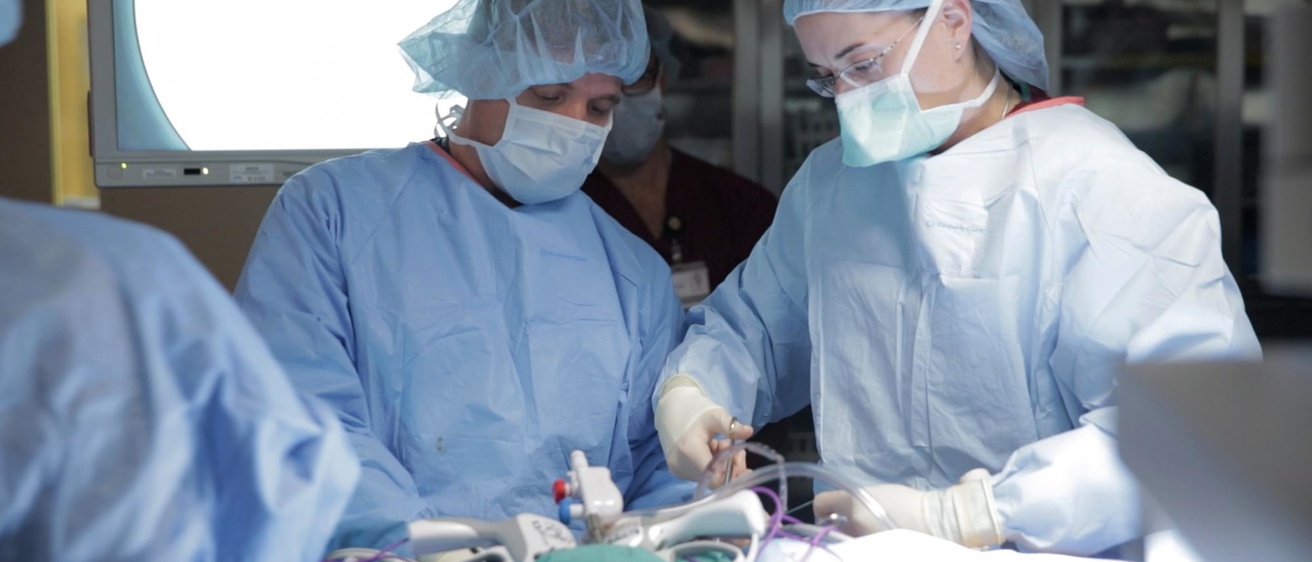Leaders of the University of Iowa Hospitals and Clinics Organ Transplant Center announced Monday, April 13, that the program has performed its 5,000th solid organ transplant.
This milestone was reached in March when a patient received a new liver.
The UI Organ Transplant Center, which also serves the Veterans Affairs Hospital in Iowa City, performed its first transplant—a kidney—in 1969. It was the state’s first transplant program and remains the only multi-organ, comprehensive transplant program in Iowa serving both adult and pediatric patients.
“We are both humbled and honored to be part of this historic milestone for Iowa’s transplant program and patients,” says Alan Reed, professor of surgery and director of the UI Organ Transplant Center. “The advancements we’re making today in transplant care are founded on the pioneering efforts, both at Iowa and elsewhere, over the past near half century of men and women dedicated to extending lives through organ transplantation.”
Ken Kates, associate vice president and chief executive officer of UI Hospitals and Clinics, extends his best wishes and appreciation to the families at the center of this 5,000th transplant.
As part of recognizing this milestone of 5,000 transplants, Kates announced that UI Hospitals and Clinics has launched its “Year of Celebrating Transplantation.” A series of events planned for the coming months will recognize the importance of organ donation, the transformed lives of transplant recipients, and the pioneering work of the UI’s transplant researchers and caregivers past and present.
Reed says that of the 5,000 transplants performed by the UI center since 1969, 431 of them (8.6 percent) involved veterans receiving care at the Veterans Affairs Medical Center in Iowa City.
“We are extremely proud of our mutually beneficial practice relationship with the VA hospital,” Reed says. “It is a privilege for our transplant teams to provide a life-changing option for these veterans who are experiencing advanced stages of organ failure.”
Since its inception, the UI organ transplant program has benefited from a strong research program on transplant matters.
“Iowa has been the home of research advances in the understanding of organ failure and the body’s systems for protecting itself from infection,” says Debra Schwinn, dean of the Roy J. and Lucille A. Carver College of Medicine. “Our success as a transplant center can be attributed to the discoveries of our research teams, advancing techniques that in many cases have been adopted as best practices in the transplant field.
“Iowans can take pride in the university’s history as a pioneer in transplant medicine,” she adds.
Jean Robillard, vice president for medical affairs and himself a pediatric kidney specialist who has cared for many transplant recipients over the years, applauds the university’s leadership in transplant care.
“We are proud to be Iowa’s leading center for organ transplant, serving the state with life-promoting transplants over these past 46 years,” Robillard says. “Iowans make up 85 percent of the patients who have received transplants at our center, and they have come from 96 of Iowa’s 99 counties.”
He adds that 9 percent of the center’s transplant recipients come from the states surrounding Iowa, and the center has served patients from 46 U.S. states and 12 other countries.
Transplant firsts for the state of Iowa, all performed at UI Hospitals and Clinics, include the following:
- 1969 – Kidney
- 1979 – Pancreas
- 1979 – Kidney and pancreas
- 1983 - Heart
- 1984 – Liver
- 1988 – Lung
- 1988 – Heart and lung
Transplant number 5,000, which involved a liver, is the second most common transplant performed at UI Hospitals and Clinics.
The 5,000 transplant percentages are as follows:
- Kidney – 66.4 percent
- Liver – 15.5 percent
- Heart – 6.7 percent
- Lung – 2.7 percent
- Pancreas – 1.4 percent
- Multi-organ transplants (including kidney/pancreas; kidney/liver; heart/kidney; and heart/lung) - 7.3 percent
Pediatric heart surgeon Joseph Turek says that while heart transplants are relatively new on the transplant timeline, the university has over the years distinguished itself as Iowa’s only heart transplantation program and earned national respect for its outcomes for adult and pediatric patients. He credits Iowa’s team approach for these successes.
“The many intricacies of caring for patients throughout their transplant journey are the epitome of a team endeavor,” Turek says. “Our transplant team approach has shaped our current 'heart team' approach to all aspects of cardiac care.”
Reed echoes the success of Iowa’s teamwork.
“We are proudest of our team approach to transplantation,” he says. “All members of the team—doctors, nurses, pharmacists, psychologists, social workers, financial counselors, administrators, and care coordinators—specialize in transplant care and focus first and foremost on the patient and his/her family.
“This milestone gives us an opportunity to reflect not only on the quantity of transplants performed at Iowa but on the quality of our outcomes,” Reed adds. “Our survival rates rank well above the national average for a center of our size and for all of the organ types.”
